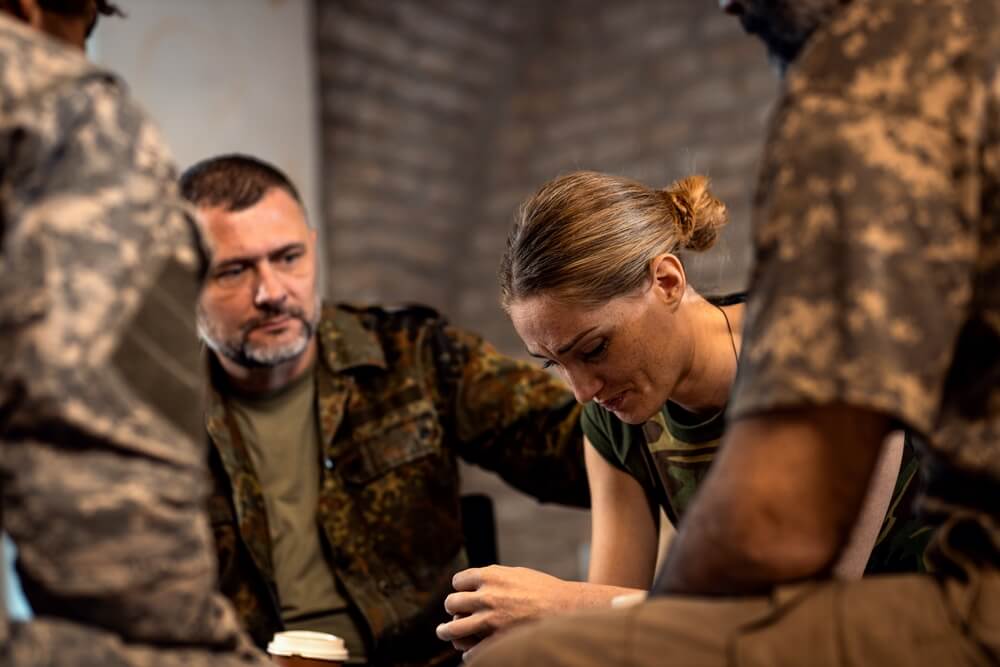
The unfortunate reality of military service, particularly for those who experience combat situations, is that involvement in traumatic episodes can lead to lasting physical and mental health consequences.
One of the most prevalent issues related to combat and military-related stress is post-traumatic stress disorder (PTSD). Combat service members often witness or experience life-threatening situations that can deeply affect their mental well-being, and the data behind veterans and PTSD statistics back this up.
Research has shown that PTSD is somewhat more prevalent among Veterans compared to civilians. Data indicates that approximately seven out of every 100 Veterans (7%) will experience PTSD at some point in their lives.
On the other hand, the general population sees a lower figure, with around six out of every 100 adults (6%) affected by PTSD during their lifetime. Female Veterans exhibit higher rates of PTSD, with 13 out of 100 (13%) affected, compared to six out of 100 (6%) male Veterans.

Do All Combat Service Members Get PTSD?
No, not all combat service members develop PTSD. While combat exposure increases the risk of developing PTSD, many individuals who experience combat do not develop trauma-related symptoms or require PTSD recovery in Los Angeles to manage the condition.
Various factors influence whether someone develops PTSD, including:
- The intensity and duration of trauma exposure
- Personal resilience and coping mechanisms
- Social support systems before, during, and after service
- Previous trauma history
- Genetic predisposition
- Access to mental health care
- Unit cohesion and military leadership during service
It’s important to recognize that while not everyone develops PTSD, many active duty service members and veterans may experience other mental health challenges or adjustment issues that don’t necessarily meet the clinical criteria for PTSD. These might include depression, anxiety, or adjustment disorders that still deserve attention and care.
How to Tell If an Individual Has PTSD?
Recognizing PTSD in veterans and active duty personnel often requires attention to behavioral and emotional changes, particularly in their daily interactions and routines. Common signs include heightened reactions to sudden noises, difficulty sleeping or frequent nightmares, emotional numbness, or unexpected angry outbursts.
Individuals might actively avoid crowds, public spaces, or once-pleasant social gatherings. They may position themselves with their backs to the wall in restaurants or constantly scan their environment for potential threats.
Some service members might struggle to maintain close relationships, withdraw from family and friends, or have difficulty expressing emotions. Changes in behavior like increased alcohol consumption, aggressive driving, or being easily startled by everyday sounds like fireworks or car backfires can also indicate possible PTSD.
PTSD symptoms can be displayed differently in each person and may not appear during or immediately after service. Some veterans might experience delayed onset PTSD, where symptoms emerge months or even years after their traumatic experiences. They might have difficulty concentrating at work, show signs of depression, or express feelings of guilt about their service experiences.
Physical symptoms can include headaches, stomach problems, and chronic pain that doesn’t have a clear medical cause. While these signs can indicate PTSD, only a qualified mental health professional can make an official diagnosis. If an individual experiences drastic mood changes, it’s crucial to approach them with sensitivity and encourage them to seek treatment for complex PTSD through a professional mental health provider experienced in treating military-related PTSD.

What Resources Are Available for Veterans Struggling With Mental Health?
Active duty and Veterans can access comprehensive mental health services through the Department of Veterans Affairs (VA), which offers specialized programs for PTSD, depression, substance abuse, and other conditions. The VA provides in-person and telehealth options, with every VA Medical Center having mental health specialists.
However, not every service member, especially on active duty, will want to use the VA for mental health services due to the unfair stigma of mental health. Moment of Clarity provides outpatient centers in Southern California, offering therapy and peer support groups specifically designed for veterans’ unique needs.
The team at Moment of Clarity understands the distinct nature of military culture, deployment stressors, combat exposure, and the transition back to civilian life. At Moment of Clarity, you’ll find clinicians trained in military-specific trauma who are able to accurately recognize and address issues like combat-related PTSD, moral injury, and military sexual trauma using evidence-based approaches that have proven effective for service members.
We Accept Most PPO Insurance Policies
All calls and submitted forms are 100% confidential. Insurance could completely cover the cost of treatment


And Many More
What Are the Benefits of Tailored Mental Health Programs for Service Members?
Tailored mental health programs address the unique experiences and challenges that military service members face. Specialized programs like Operation Clarity understand the distinct nature of military culture, deployment stressors, combat exposure, and the transition back to civilian life.
Past and present service members often respond better to treatment when providers understand military terminology, rank structure, and service-related experiences. This knowledge of military culture builds trust and rapport, increasing program engagement and reducing dropout rates. Moment of Clarity also incorporates peer support components, connecting individuals with others who have similar experiences, which reduces feelings of isolation and creates a sense of camaraderie similar to what many experienced during service.
Comprehensive military-specific programs simultaneously address multiple aspects of well-being, recognizing how mental health connects with physical health, employment challenges, relationship issues, and housing stability. This holistic approach leads to better long-term outcomes than treating mental health in isolation.

Access to Active Duty and Veteran PTSD Treatment
PTSD is a complex mental health condition that often requires professional treatment to manage. The condition rarely improves on its own and can significantly impact every aspect of a service member’s life if left untreated. Treatment programs for trauma and other conditions designed specifically for military personnel can more effectively navigate the complex nature of PTSD, ensuring individuals receive all the support they’re entitled to.
The Southern California area is known for its significant military presence, and Moment of Clarity has a series of outpatient treatment centers for mental health near various cities, including San Diego and Los Angeles. We also provide transitional housing services to help patients access stable environments to help provide more support throughout treatment.
Just like the U.S. military has a ‘no man left behind’ motto, Moment of Clarity aims to provide each patient full access to our mental health services. Even if one of our patients loses insurance eligibility during treatment, our scholarship program ensures they can continue receiving the help they need at our facility.
Treatments at Moment of Clarity can help active duty and veterans regain control over their lives, rebuild relationships with family and friends, and reduce the intensity of symptoms like nightmares, flashbacks, and hypervigilance. Our mental health professionals who work with veterans understand the unique military culture and experiences that many therapists might not fully grasp, making our treatment center better equipped to provide effective, culturally competent care. Please contact Moment of Clarity at (949) 649-7372 for expert help today.
External Sources
- U.S. Department of Veteran Affairs – PTSD: National Center for PTSD
- National Library of Medicine – Posttraumatic Stress Disorder in the US Veteran Population: Results From the National Health and Resilience in Veterans Study
- National Library of Medicine – Department of Veterans Affairs Mental Health Services: Need, Usage, and Access and Barriers to Care

